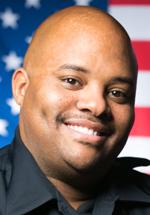Omaha police grapple with hiring — and keeping — officers | Crime News
[ad_1]
Eleven months ago, when a class of 60 Omaha police recruits began their training, city officials hoped the group would bring the department near its authorized strength of 906 officers.
But the newly sworn officers — those with previous law enforcement experience who got their OPD badges in July, plus rookies who graduated in October — only offset the number of departures the force experienced.
OPD’s net gain in police numbers since May is three officers. As of Friday, the city’s number of full-time, sworn officers stands at 844, compared to a historic high of 886 two years ago. OPD has never reached the 900-officer target announced by Mayor Jean Stothert and the department in 2017, two years before the agency’s fifth precinct opened in the Elkhorn area.
People are also reading…

Todd Schmaderer
Police Chief Todd Schmaderer has recognized the gaps, which follow a recent national trend of police departments having difficulty in hiring and retaining officers. Many attribute the problem to news media attention on policing and high-profile cases, stressors from protests in 2020 and/or the COVID-19 pandemic.
“We’ve seen a more aggressive number of those leaving the Omaha Police Department or either retiring early,” Schmaderer said. “A lot of the exit interviews just center around burnout and loss of interest in the career … Fortunately, we’re not near the level that some cities are.”
Yet staffing levels could drop further before they rise.
Monday, 14 recruits begin training — if they stick around, six veteran or “lateral” recruits will become sworn OPD officers after 11 weeks of training and eight more will receive their badges after 22 weeks of training.
If the pattern of departures continues, the small class may not even cover the losses that occur by the time the first recruits graduate. Twelve officers retired or left during the same 11-week period last year.
Schmaderer said staff vacancies are an issue that needs to be solved but aren’t so high that residents should notice.
“The public likely won’t feel the impact of it,” he said. “It’s not to that level. But it’s cause for management attention to deploy our resources appropriately.”
Meanwhile, officials plan to start another recruit class at the end of this year. They currently are accepting applications in order to fill that class, which they said should be close to if not at the full capacity of 60 recruits. But troubles remain, as OPD extended the monthlong application period another 2½ weeks, presumably because of a lack of job applicants.
Police union president Tony Conner said he was told that OPD received just over 200 applications in three weeks — a fifth of the total number of last year’s applicants and 13% of the typical average of 1,500 applicants in prior years.

Sherie Thomas
Acting Deputy Chief Sherie Thomas, who heads the Executive Services Bureau that oversees hiring and the training academy, declined to provide the number of people who have applied until the application period closes, which is now on April 18.
Conner said a large applicant pool is important because the process is arduous, with several steps — a written exam, an interview and a physical, then backgrounding that includes drug and vision tests and a credit check. Some people don’t even show up to the first test, he said, and each part can weed out more and more applicants to find “the best and the brightest” that ultimately will represent OPD.
Even after a class is finalized, dropouts can occur — five of the recruits from the May 2021 class didn’t make it to graduation.
Conner fears that the impact of a decreased force could correlate to fewer services. But he said hiring requirements shouldn’t change.
“If we maintain our standards, if there’s less services because there’s less officers on the street, I think the public would accept that before they ever accept us lowering our standards,” he said.
Thomas said there’s no need for concern regarding the availability of officers responding to high-priority radio calls. A new call center, which was created during the pandemic, also helps take nonemergency reports over the phone instead of dispatching an officer, she said.
The recruiting requirements are the same as they have been in previous years, Thomas said, but OPD now can offer a new incentive for out-of-state law enforcement officers. Such officers now can complete an 11-week training course instead of the full 22-week class that rookies take.
Monday’s class has 12 men and two women. The class is made up of 12 Whites and two Hispanics.
Officials had hoped the class would be closer to 30-35 recruits.
Thomas said OPD officials know that the class is smaller and not as diverse as they would have liked. Last year’s class shattered previous records for diversity and size.
The city also is hiring for 30 civilian, non-sworn positions that are vital to OPD operations, Thomas said.
“We are hopeful that our current recruiting process is successful in attracting individuals that will assist us with being reflective of the community we serve,” she said. “We will continue to be intentional in our recruiting efforts.”
Police departments across the nation have tried various strategies to recruit, said Jessie Huff, an assistant professor in the School of Criminology and Criminal Justice at the University of Nebraska at Omaha. Some departments, she said, have been offering signing bonuses and housing stipends but also adjusting credit score and physical fitness standards. Huff said departments should consider additional ways to appeal to a broader pool of applicants, which should include women and people of color.

Jessica Huff
“People are concerned that this is lowering the bar or lowering the standards, but that’s not the case,” she said. “We can still use thorough background-check processes to bring in the right people but eliminating some barriers to include those who have the potential to be great officers but couldn’t meet basic roadblocks.”
OPD recently started a TikTok account, called joinOPD, which on Friday had more than 93,000 followers and more than 210,000 likes across their 14 videos, which show short snippets of life as an officer and the hiring process. One 8-second video of an officer and his K-9 has racked up more than 1.3 million views.
And OPD has a direct pipeline to UNO students interested in a law enforcement career, with the help of retired OPD Sgt. Kim Retzlaff, an adjunct professor and the internship coordinator at UNO’s criminology and criminal justice school.

Kim Retzlaff
Retzlaff has gotten phone calls from local, Nebraska and even out-of-state law enforcement agencies looking to hire qualified applicants. UNO’s program, which is available on the University of Nebraska’s Omaha and Lincoln campuses, consistently has increased its enrollment since 2017 — this semester, Retzlaff said, 985 students are taking classes.
Retzlaff has formed a Future Law Enforcement Professionals group and encourages students to attend meetings, which feature speakers who work in all sorts of niches that agencies can offer. She was heartened to recently hear from 10 future students — all women — who were interested in a law enforcement career.
“When I speak with students, I tell them that law enforcement is changing, it’s progressing,” she said. “I think that it’s still a very noble profession and one that’s not gonna go away. We need peacekeepers in our community.”
Current OPD officers are leaving for various personal or professional reasons. According to city human resources records, 54 officers left the job in 2021, compared to 30 in 2017. (The records count a person’s final employment date with the city, not his or her last working day on the job.)
A larger percentage of the departures is coming from officers on the Deferred Retirement Option Program, which is open to workers with 25 years of service. The plan allows the city to retain experienced officers longer and gives the officers a financial incentive to stay.
However, more officers are deciding to retire earlier than planned or move on to other opportunities — in line with the “Great Resignation” phenomenon that the nation has seen in the last two years.
Former Officer Christy Jaworski retired in April 2021 after 22½ years on the job. About two years before that, she had been considering retiring to spend more time with her son, who is now 8 years old. She also said she wanted to take care of her health after she was diagnosed with thyroid cancer.
“I was on call a lot,” said Jaworski, a former detective in the child victims and domestic violence units. “I just wanted to be there more for my family.”
While she said the pandemic didn’t accelerate her decision, it was made clearer after she worked the May 2020 civil rights demonstrations . She recalled seeing a sign that said, “A good cop is a dead cop,” which jarred her.
“I saw some very hateful people toward police officers … I know that it doesn’t reflect everybody, but it was very hard to see a job that I love so much become so hated by the vocal minority,” she said. “That was not the deciding factor, but it definitely made my decision easier in my mind.”
Because of all the factors, she said, she didn’t feel that a 2% pension increase per six months of work was worth it, so she retired as soon as she was able.
“The police department is very understaffed in general — all police departments probably are,” she said. “I know of a few people who just were in the detective bureau, and the caseloads were really high.”

Tony Conner
Conner also mentioned an officer he used to patrol with who retired last year after 22½ years — earlier than originally planned — because of recent events.
“The events of 2020 shaped some people’s view of law enforcement. Our job was on the front page of every paper and the top story on every news program,” he said, adding that it’s a factor that is absolutely affecting retention. “It’s the stress of the job that gets to them. It’s a lot of work, it’s not easy, it’s a challenging job.”
Thomas said someone she had recruited to the force left to prioritize family and personal life.
Two officers who recently retired stuck around for 30 years, which is rare. After about a month off, former Officer Constance Garro got a job with a company that facilitates regional drug task forces and contracts with the city, so she’s back working with the OPD narcotics unit from which she retired.
Garro said a lot of officers’ retirement decisions are based on their financial situations and concerns about supporting their families, which is different for everyone.
Former Lt. Vivian Buckley, who oversaw OPD’s customer service unit, said she wasn’t looking at other jobs and continued to work until she hit 30 years. She was just the seventh female Black officer in the history of the department. She said she wants OPD to prioritize hiring diverse recruits.
“We don’t get hired at the rate that other, Caucasian women get hired. That’s an issue,” she said. “Have more African-American people, then the police force might be better. And put them in positions of leading vs. following. There needs to be a lot more diversity in all positions of the police department, on the job.”
Others who leave before retirement often go on to other careers — officials have said it’s unusual for an Omaha officer to head to another agency. More common is Omaha attracting officers from other agencies.
Conner stressed that even though the job is tough, it’s rewarding. He said Omaha offers many pluses that make it the best place to be a police officer — a seasoned and respected police chief, support from the mayor and City Council and high approval from the community. The Omaha Police Officers Association recently conducted a poll that found 89% of Omahans support OPD, which is 5% higher than the national average attitude toward police, he said.
“The public needs to know we are truly helping people every single day, people that are perfect strangers to us. And people who like to do that type of work, I want them to consider law enforcement,” he said. “For those people out there considering, the Omaha Police Department is the best department in the entire country, and I will defend that if anyone wants to debate me.”
alia.conley@owh.com, 402-444-1068, twitter.com/aliaconleyOWH
[ad_2]
Source link